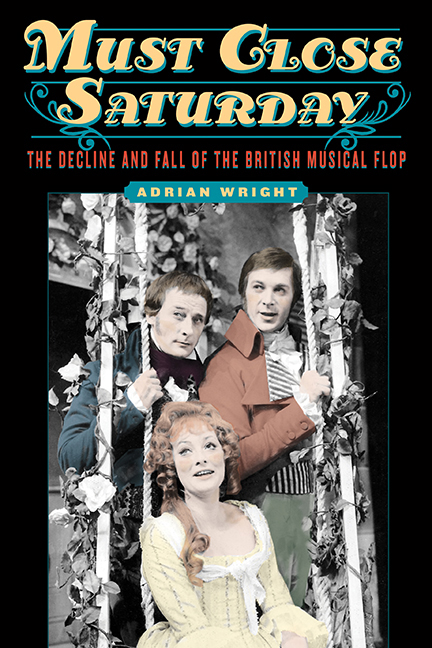Book contents
- Frontmatter
- Contents
- List of Illustrations
- Preface and Acknowledgements
- 1960
- 1961–1964
- 1965–1966
- 1967–1969
- 1970–1972
- 1973–1976
- 1977–1979
- 1980–1983
- 1984–1989
- 1990–1999
- 2000–2005
- 2006–2016
- Appendix: British Musical Flops in London 1960–2016
- Notes to the Text
- Select Bibliography
- Index of Musical Works
- General Index
- Frontmatter
- Contents
- List of Illustrations
- Preface and Acknowledgements
- 1960
- 1961–1964
- 1965–1966
- 1967–1969
- 1970–1972
- 1973–1976
- 1977–1979
- 1980–1983
- 1984–1989
- 1990–1999
- 2000–2005
- 2006–2016
- Appendix: British Musical Flops in London 1960–2016
- Notes to the Text
- Select Bibliography
- Index of Musical Works
- General Index
Summary
‘It is both tedious and saddening to watch that high-minded headmaster Dr Arnold making up to a cabaret-voiced matron’
Sunday Telegraph on Tom Brown's Schooldays1970: ‘Erb Mandrake Sing a Rude Song Lie Down, I Think I Love You Isabel's a Jezebel
The new year marked a real shift in British musical flops, slightly more encouraging to anyone who wanted to see them progress than to those who had money invested in them. Along the way there was a lot of rather dreadful rudeness that would have seemed unthinkable to creators of musical theatre even five years before.
The 1960s had seen a few shows vaguely connected to Trade Unionism: The Match Girls and its successor Bryant and May Strike a Light!, and the 1967 Moral Re-Armament Annie, a surprise long-runner at the Westminster Theatre. ‘Erb (Strand Theatre, 7 April 1970; 38) was another attempt to interest audiences in social issues. Ronald Harwood, who would turn J. B. Priestley's The Good Companions into a rather dull musical four years later, acquired the rights to William Pett Ridge's 1903 novel. Harwood suggested that Trevor Peacock should write its music, book and lyrics. He seemed the perfect choice. Although Peacock had written the lyrics for Passion Flower Hotel, he couldn't read or write music; it was up to arranger Gareth Davies to turn Peacock's tunes into a score for the show's debut at Manchester University Theatre in 1969.
Ridge's ‘Erb, properly Herbert Barnes, is a richly Dickensian character, Bermondsey-born. Cockney socialist hero, Labour Party enthusiast, park orator and humanist, he is a parcel carman on the railway, earning 23 shillings and 6d a week, and reading John Stuart Mill for light relief. Ridge, a prolific novelist in the line of Dickens, was himself a humanitarian, having established the Hoxton Babies Home in 1907. Like ‘Erb, Ridge's ideal was to see the world ‘better and brighter’, in line with the Bryant and May girls, Pickwick and Annie Jaeger. So it was that ‘Erb created the first trade union for van drivers.
- Type
- Chapter
- Information
- Must Close SaturdayThe Decline and Fall of the British Musical Flop, pp. 81 - 108Publisher: Boydell & BrewerPrint publication year: 2017



